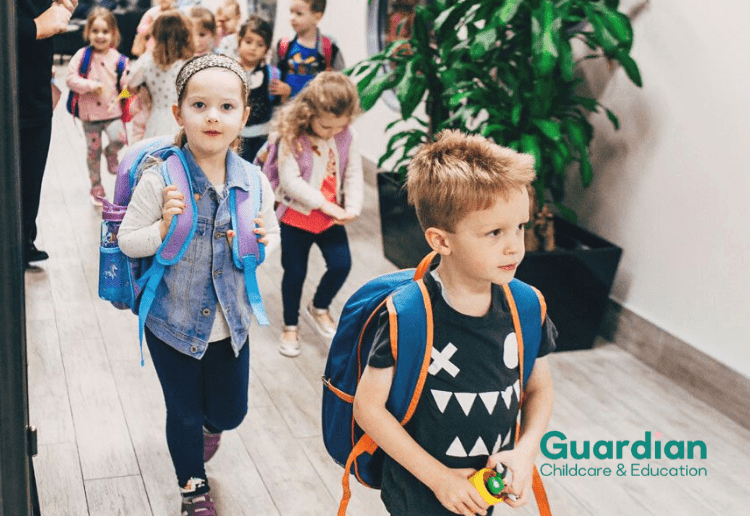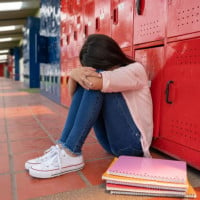If you’re on the countdown to when your child starts school, it can be a scary thought for many families (and children). But it’s also an incredibly exciting time. It’s the end of an era but the start of a new journey as your child makes the big leap to primary school.
This year has highlighted the importance of connection and relationships in learning like never before. Globally, families have been concerned about the pause that has been put on schooling and early learning due to the COVID-19 pandemic. This is particularly the case for young children who are preparing for the exciting transition to school.
Will they be ready? Will the interruptions mean they’re less prepared socially, developmentally and academically? How can I help my child make the most of the months leading up to starting school to make sure they’re as ready as they can be?
Well, even amidst a global pandemic, there are many things you can do to support your child as they prepare to take the next step in their learning journey. Guardian Childcare and Education offers a Summer Learning Program, providing consistency and continued learning over the busy summer period, which is especially vital for those children approaching primary school.
And this year Guardian are also running A Flying Start to School for older children. This is a special program with additional experiences specifically designed to prepare children for their transition to school. This is part of Guardian’s response to the interrupted lead up to Primary School that many children and families have experienced.
Reassuringly, Guardian Childcare and Education Curriculum Mentor Simone Myskiw says, “Families of children starting school next year need not panic! Children are preparing for school from the moment they are born. They are learning, developing and growing every single day.”
“And while high-quality early education and care is key during those important first five years, a child does not magically become ‘ready for school’ at age four of five. That’s why, at Guardian, we’re helping prepare them for this transition from the very first day we meet them, and why we partner with and encourage families to continue the learning at home wherever possible.”
Inspired by this program, the experts at Guardian Childcare and Education have pulled together some tips to support you at home as you help prepare your child for school …
Wrap Their Food
At home and in childcare, children are rarely given the opportunity to do activities such as unwrapping their lunch. Families and educators will do this for them, and meals are less likely to be wrapped at home or childcare – so for many children, this can be a new experience and challenge.
“Every year, we host Lunch Box Days at our Centre. This is when, instead of our chef making the children their meals like they do every other day, the children bring their own packed lunches from home,” says Melinda Parker, Centre Manager at Guardian Childcare and Education Rouse Hill North.
“Lunch Box Day allow children to practise taking the wrapping off, or even opening up their lunch boxes and containers, which can be surprisingly tricky at times. By learning this before they go off to school, the children will have a lot more confidence when it comes time for recess and lunch at school. They will feel prepared and able to do things for themselves, which is key in developing self-assurance and resilience.”
This is something you can try at home with your child – arrange a picnic at the local park or in the backyard, and have your child unwrap the sandwiches and open the containers.
Practise Independence
Becoming more independent is one of the biggest changes your child will go through when starting primary school. Children are expected to be accountable for their belongings (although, be prepared for a few lost jumpers and hats along the way…), to follow the teacher’s instructions, and even master those fiddly skills such as doing up zippers, buttons and belts.
While these activities will take time to master, it’s a great idea to start practising these tasks at home with your child. Allow them to dress themselves in something that’s a bit fiddly (think pants with zippers; a shoe with Velcro straps; a button-up dress). Being able to manage everyday tools and tasks, following processes and multi-step instructions all help your child as they develop their independence.
Encourage Tricky Play
‘Tricky’ experiences, as they’re known at Guardian, are the physical and mental challenges that are associated with certain activities or situations that challenge children to grow and learn. Think climbing a fort, rolling down a hill or balancing on a wobbly log. Such experiences help develop a child’s resilience, confidence, decision making skills and risk assessment – all essential skills to have as your child begins primary school. Opportunities for physical play also develop their coordination, balance, fine and gross motor skills.
“A way that we encourage tricky play in our Centre is through using our outdoor equipment, in particular our wooden fort. The children absolutely love it, and there are countless benefits to them using it,” says Sarah Lean, Centre Manager at Guardian Childcare and Education Freshwater.
“Climbing the fort involves children using their core strength as they pull themselves up the steep incline. It also presents the children with certain challenges that will test their balance and coordination, while simultaneously developing their cognitive thinking. Thoughts such as ‘If I place my foot here, I can climb down safely’ rush through their minds.”
You can practice ‘tricky’ play with your child outside of childcare, too – take them to the local park where they can race up the climbing net and roll down the hill, go on a bush walk or set up an obstacle course in your own home!

Read Together
This may seem like an obvious one, but reading, listening and conversational experiences are incredibly beneficial in supporting your child on their journey to becoming a reader, and hence preparing them for school. These skills can all be practiced through simply sitting down with your child and spending some quality time with just them and a good book. Your child will improve not only their reading, but also listening and waiting their turn to speak while you read to them.
You and your child can also share conversations about the book, through questions such as, “Do you know what that word spells?”, or discussing the characters together.
Other simple ways you can help you child prepare for school at home include:
- Name play – help you child recognise their name with name games, creating opportunities from them to identify and practise writing their name across the day – from ‘signing in’ each day to going on a name ‘hunt’ with letters hidden around the house.
- Pretend play is another way you can improve your child’s understanding of school. Try dressing up in old school uniforms to role-play a teacher, principal, librarian, PE or music teacher. You can also practise how to ask for help.
- Making friends at school is often key to children enjoying school. Have some discussions around friendships and what makes a friend, and how to join in and play, to help them forge new friendships. If you do know children starting school at the same time, organise some playdates so your child knows a friendly face on their first day.
As the list shows, there are many different ways you can help your child prepare for school before they begin next year. However, important social skills – such as sharing and playing and connecting with children their own age – are often best practised while surrounded by other children.
Find out more about the Guardian Summer Learning Program and A Flying Start to School, which are completely free for existing families and will run December 14, 2020 – January 29, 2021 at every Guardian Centre.
If you would like to experience the Guardian difference and secure your child a place in our Summer Learning Program, book a tour today!
We may get commissions for purchases made using links in this post. Learn more.




















11:14 am
12:16 pm
12:02 pm
7:52 am
8:45 am
9:42 pm
9:57 pm
8:42 am
7:29 pm
9:23 pm
6:58 pm
8:42 am
8:26 am
7:02 am
10:56 pm
-

-
-
-
Ellen replied
- 12 Nov 2020 , 8:54 am

Reply- 1
- 2
- »
Post a comment